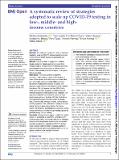Files in this item
A systematic review of strategies adopted to scale up COVID-19 testing in low, middle and high-income countries
Item metadata
| dc.contributor.author | Muttamba, Winters | |
| dc.contributor.author | O'Hare, Bernadette Ann-Marie | |
| dc.contributor.author | Saxena, Vibhor | |
| dc.contributor.author | Mudarshiru, Bbuye | |
| dc.contributor.author | Tyagi, Parul | |
| dc.contributor.author | Ramsay, Andrew | |
| dc.contributor.author | Kirenga, Bruce | |
| dc.contributor.author | Sabiiti, Wilber | |
| dc.date.accessioned | 2022-11-17T16:30:28Z | |
| dc.date.available | 2022-11-17T16:30:28Z | |
| dc.date.issued | 2022-11-17 | |
| dc.identifier | 281742603 | |
| dc.identifier | e6388455-5ba2-4332-b496-9fa3e0b6a287 | |
| dc.identifier | 85142135545 | |
| dc.identifier | 000924531200004 | |
| dc.identifier.citation | Muttamba , W , O'Hare , B A-M , Saxena , V , Mudarshiru , B , Tyagi , P , Ramsay , A , Kirenga , B & Sabiiti , W 2022 , ' A systematic review of strategies adopted to scale up COVID-19 testing in low, middle and high-income countries ' , BMJ Open , vol. 12 , no. 11 , e060838 . https://doi.org/10.1136/bmjopen-2022-060838 | en |
| dc.identifier.issn | 2044-6055 | |
| dc.identifier.other | ORCID: /0000-0003-1730-7941/work/123195830 | |
| dc.identifier.other | ORCID: /0000-0001-9411-5527/work/123196192 | |
| dc.identifier.other | ORCID: /0000-0002-4742-2791/work/123196640 | |
| dc.identifier.uri | https://hdl.handle.net/10023/26430 | |
| dc.description | Funding: Authors acknowledge funding from the Scottish Funding Council/Global Challenges Research Fund grant (SMDO-XFC119) and the School of Medicine University of St Andrews that is funding Winters Muttamba’s PhD study. | en |
| dc.description.abstract | Objective We undertook a systematic review of strategies adopted to scale up COVID-19 testing in countries across income levels to identify successful approaches and facilitate learning. Methods Scholarly articles in English from PubMed, Google scholar and Google search engine describing strategies used to increase COVID-19 testing in countries were reviewed. Deductive analysis to allocate relevant text from the reviewed publications/reports to the a priori themes was done. Main results The review covered 32 countries, including 11 high-income, 2 upper-middle-income, 13 lower-middle-income and 6 low-income countries. Most low- and middle-income countries (LMICs) increased the number of laboratories available for testing and deployed sample collection and shipment to the available laboratories. The high-income countries (HICs) that is, South Korea, Germany, Singapore and USA developed molecular diagnostics with accompanying regulatory and legislative framework adjustments to ensure the rapid development and use of the tests. HICs like South Korea leveraged existing manufacturing systems to develop tests, while the LMICs leveraged existing national disease control programmes (HIV, tuberculosis, malaria) to increase testing. Continent-wide, African Centres for Disease Control and Prevention-led collaborations increased testing across most African countries through building capacity by providing testing kits and training. Conclusion Strategies taken appear to reflect the existing systems or economies of scale that a particular country could leverage. LMICs, for example, drew on the infectious disease control programmes already in place to harness expertise and laboratory capacity for COVID-19 testing. There however might have been strategies adopted by other countries but were never published and thus did not appear anywhere in the searched databases. | |
| dc.format.extent | 11 | |
| dc.format.extent | 983326 | |
| dc.language.iso | eng | |
| dc.relation.ispartof | BMJ Open | en |
| dc.subject | COVID-19 | en |
| dc.subject | RA0421 Public health. Hygiene. Preventive Medicine | en |
| dc.subject | NDAS | en |
| dc.subject | SDG 3 - Good Health and Well-being | en |
| dc.subject | MCC | en |
| dc.subject.lcc | RA0421 | en |
| dc.title | A systematic review of strategies adopted to scale up COVID-19 testing in low, middle and high-income countries | en |
| dc.type | Journal article | en |
| dc.contributor.sponsor | Scottish Funding Council | en |
| dc.contributor.institution | University of St Andrews. Infection and Global Health Division | en |
| dc.contributor.institution | University of St Andrews. School of Medicine | en |
| dc.contributor.institution | University of St Andrews. Population and Behavioural Science Division | en |
| dc.contributor.institution | University of St Andrews. Centre for Energy Ethics | en |
| dc.contributor.institution | University of St Andrews. School of Economics and Finance | en |
| dc.identifier.doi | https://doi.org/10.1136/bmjopen-2022-060838 | |
| dc.description.status | Peer reviewed | en |
| dc.identifier.grantnumber | N/A | en |
This item appears in the following Collection(s)
Items in the St Andrews Research Repository are protected by copyright, with all rights reserved, unless otherwise indicated.

